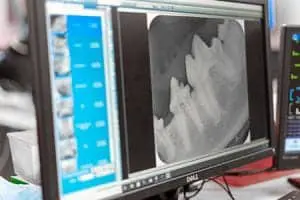The Veterinary Dental Center of Atlanta is dedicated to providing the highest quality dental care for your furry friends. Just like humans, pets need regular dental checkups and treatments to maintain their oral health. However, it can be difficult to tell when your pet is in need of dental care. Here are 7 signs that your pet may need dental treatment:
- Bad breath: If your pet has a persistent bad odor coming from their mouth, it could be a sign of dental problems.
- Yellow or brown buildup on teeth: Plaque and tartar can build up on your pet’s teeth, leading to tooth decay and gum disease.
- Sensitivity around the mouth: If your pet is sensitive to touch around their mouth or avoids having their face or mouth touched, it could be a sign of dental pain.
- Bleeding gums: If your pet’s gums are bleeding, it’s a sign of gum disease and a need for dental treatment.
- Decreased appetite or difficulty eating: Dental problems can make it difficult or painful for your pet to eat, resulting in weight loss or a decreased appetite.
- Pawing at the mouth: If your pet is constantly pawing at their mouth or rubbing their face, it could be a sign of dental pain.
- Loose or missing teeth: Loose or missing teeth are a sign of advanced dental problems and require immediate attention.
If you notice any of these signs in your pet, it’s important to schedule an appointment with the Veterinary Dental Center of Atlanta as soon as possible. Regular dental checkups and treatments can help prevent serious dental problems and keep your pet happy and healthy.
Proactive Dental Care Starts With Your Pet’s First Visit
Pets experience dental problems just like people do. The American Veterinary Medical Association (AVMA) estimates that 80% of dogs and cats older than 4 years have moderate to severe dental disease. It doesn’t have to be that way, though!
Each year, the AVMA designates February as National Pet Dental Health Month in an effort to raise awareness among pet parents about the importance of regular pet dental care and cleaning, all year round.
Check to see if your dog or cat shows any of these seven signs. If so, she may need dental treatment.

#1: Bad Breath
Contrary to popular belief, it’s not “normal” for your pet to have bad breath. Bad breath may be common in pets, but that’s typically because the pet doesn’t get regular tooth brushing and dental cleaning. Bad breath is the most frequent sign of looming dental problems, and breath that smells like rotten eggs it could indicate the presence of periodontal disease. Even slightly bad breath means bacteria are trapped in the pet’s mouth. A professional dental cleaning and examination can make the world of difference to your pet’s lifetime dental health!
#2: Eating Difficulties
If you see your dog or cat having difficulty chewing her food or she suddenly loses interest and appetite, she might need pet dental care urgently. Loss of interest in food can indicate oral infection or inflammation that could be caused by pet gum disease or gingivitis in dogs or cats. Refusing hard foods in particular could be a sign that she’s finding it hard to chew.
#3: Problem Gums
Inflamed, swollen or bleeding gums are often a symptom of a bacterial infection. The inflammation can cause significant pain and discomfort which can often be reversed by a professional dental cleaning or removing a specific problem tooth.
#4: Stained Teeth
Yellow and brown stains on pet’s back teeth and around the gum line are signs of tartar build-up. These go hand-in-hand with bad breath and bacterial infections and can usually be removed by a professional cleaning before they become problematic. Of course, brushing your pet’s teeth daily can prevent this from happening in the first place, helping maintain your pet’s general good health.
#5: Loose and Broken Teeth
If your pet’s teeth are loose or have fallen out, this indicates advanced dental problems that require immediate attention.
#6: Tumors on Gums
Tumors or growths on your pet’s gums could be benign or malignant, and the only way to find out is to have her examined by a veterinarian without delay. If a tumor is found to be malignant, the treatment might require the removal of some of her teeth and/or a section of her jawbone. Pet parents who brush their dog’s or cat’s teeth daily are more likely to notice tumors in early stages, which is an additional reason to practice good pet dental care.
#7: Pawing and Drooling
If your dog begins drooling excessively or pawing at her face, she could have a dental abscess that is causing pain and discomfort. The carnassial tooth or fourth upper premolar tooth (the “canine” tooth) is particularly prone to developing abscesses, usually as a result of:
- Trauma to the tooth
- Fighting
- Chewing hard items
- Bacteria from periodontal disease

Proactive Dental Care Starts With Your Pet’s First Visit
You might think it’s normal for your cat or dog to lose teeth as she gets older, but loose and broken teeth are often signs of a more serious pet dental care issue. If bacteria have eaten away the binding that holds the tooth in place, an infection probably exists or is in the process of developing. A loose tooth can also be caused by chewing on something too hard, which might open the root of the tooth and result in infection. Any oral bacterial infection can spread to the rest of your pet’s mouth, and eventually to the rest of her body.
Your veterinarian will usually remove the affected tooth and drain the abscess. Your pet might need antibiotics to help clear up the infection during the recovery process.
Practicing regular pet dental care can prevent many of these problems. If your pet develops signs of dental disease, the sooner she receives treatment, the more likely she is to heal completely.
How Much Do You Know About Pet Dental Health, Now?
Try the AVMA dental health quiz and see how up-to-date you are about pet dental health.
